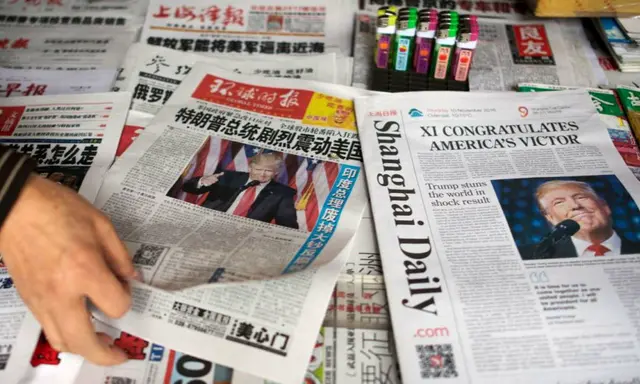Hong Kong is “watching and monitoring” trade and foreign policy changes under Donald Trump’s incoming administration, the city’s top official in the United States told the Post.
Clement Leung Cheuk-man, Hong Kong’s commissioner for economic and trade affairs in the US, expressed confidence in Washington maintaining a good relationship with the city, despite the Republican’s anti-China and anti-trade rhetoric on the campaign trail.
“Of course, we are watching … It is our responsibility to monitor legislation, policy or other administrative measures [in the US], things that may have an impact on our trade relationship and our economic cooperation,” Leung said at Hong Kong’s economic and trade office in Washington.
“I would say that this is still [in the] very early days. The election has just been completed. So we are waiting to see, for example, the appointments to key positions of influence, like the secretary of state, his team, and the Treasury etc.”
On the campaign trail, Trump repeatedly claimed China had stolen jobs that would be taken back to the US. One of his Hong Kong is “watching and monitoring” trade and foreign policy changes under Donald Trump’s incoming administration, the city’s top official in the United States told the Post.
Clement Leung Cheuk-man, Hong Kong’s commissioner for economic and trade affairs in the US, expressed confidence in Washington maintaining a good relationship with the city, despite the Republican’s anti-China and anti-trade rhetoric on the campaign trail.
“Of course, we are watching … It is our responsibility to monitor legislation, policy or other administrative measures [in the US], things that may have an impact on our trade relationship and our economic cooperation,” Leung said at Hong Kong’s economic and trade office in Washington.
“I would say that this is still [in the] very early days. The election has just been completed. So we are waiting to see, for example, the appointments to key positions of influence, like the secretary of state, his team, and the Treasury etc.”
On the campaign trail, Trump repeatedly claimed China had stolen jobs that would be taken back to the US. One of his manifesto promises was to “instruct the US Trade Representative to bring trade cases against China, both in this country and at the World Trade Organisation”.
This would put Hong Kong in a potentially risky position, as its main and second largest trading partners are China and the US.manifesto promises was to “instruct the US Trade Representative to bring trade cases against China, both in this country and at the World Trade Organisation”.
This would put Hong Kong in a potentially risky position, as its main and second largest trading partners are China and the US.
Hong Kong is the ninth largest market for products made in the US, worth US$37 billion last year, Leung said.
The American Chamber of Commerce represents more than 1,200 US companies doing business in Hong Kong, of which over 800 are regional offices or headquarters.
Trump would find up to 4,000 positions in his transition team, US media reported.
“Of course we are looking forward to see whether there will be any change in policies,” Leung said. “But we are confident that [the] very close cooperation will continue under a Trump administration.
“I’m sure that the US is very keen to preserve its very special relationship with Hong Kong.”
As trade commissioner, Leung is the de facto diplomat-in-chief for Hong Kong, which does not conduct foreign affairs under the Basic Law, the city’s mini-constitution. After he assumed his role in 2014, he met nearly 70 members of Congress, at times in tense situations such as the Occupy protests and the disappearance of several city booksellers.
“I would say that there is still a very strong degree of goodwill among officials, congressional members, within the think tank community and with respect to the business community in the US,” Leung said. “I think a lot of that goodwill stems from Hong Kong being a very free economy.”
(SOUTH CHINA MORNING POST)
 简体中文
简体中文

